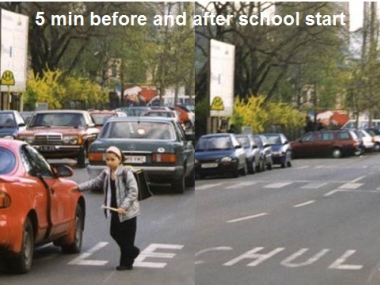How to design exchange and learning experiences for local challenges in developing sustainable urban mobility plans
Edited on
23 August 2017CityMobilNet partners had a dense time of learning and preparing the crucial steps for their Integrated Action Plans beginning of 2017. Now, at the 4th transnational seminar in Braga (PT), it was about time to have a look at the achievements: how are partners advancing for creating their vision and priorities on sustainable urban mobility development? How things do looks for decisions on measure selection and which mechanisms are used to perform the selection? CityMobilNet made use of highly different but entertaining tools to exchange and learn on these steps from each other, employing TV-shows, silent whispers games and speed dating.

After two seminars in February and April focusing on the set-up of visions and priorities as well as measure selection, it was about high time to look at the achievements and challenges from local work. The 4th CityMobilNet seminar in Braga (PT) used a different approach compared to the previous ones: less external input in favour of focusing mainly on our partners’ very own local situations. To avoid iterating work sessions of the same style, some approaches new to the partnership were tested.
The first approach was a TV-Show. Partners gathered in a setting of 3 podium guests, a moderator and the audience forming a classical set of a TV-show studio. One TV-show was on how to create a joint vision locally and how to come to the right priorities. A second following on the first was on methods for measure selection and appraisal. The rules of the TV-show were easy: the moderator directed prepared questions to the podium guests as well as to the audience. All guests and audience members were welcomed to direct any question to each other. To safeguard a lively and triggering discussion, a special role was integrated as well: the one of the “annoyer”, a person in the audience briefed to ask difficult and uncomfortable (but fair) questions. Having done this in two groups, the conclusions were presented to all partners in a news broadcast by the two moderators. The TV shows highlighted the different approaches taken by the partners and offered new ideas to employ locally for all partners.
The second approach was rather contrasting: an adaptation of the child game “silent whispers” was used to discuss input needed for specific measures by each partner. Partners formed groups of 7-8 persons, each bringing a specific measure to the group they wanted to learn more about. The measure and some details were noted down on a sheet of paper and here the game started: Papers were handed to the right hand person with the tasks to add ideas and experiences to the paper. This was repeated until the paper returned to the paper’s owner. Time for giving input was short – just 4 min. Having concluded the cycle of actually “written” silent whispers, each partner presented the input received and used the option to ask questions and make further connections to the most interesting points. This work approach turned out to be very intensive due to giving input to 6-7 measures in a short time. However, the results each partner received for the own measure were both, comprehensive and following different ideas.
The third approach concentrated on the needs of partners for their local work set aside of specific mobility related problems. It employed the idea of speed dating. All partners sat at a long row of tables facing each other. They had about 8 min time to exchange on their own local challenges and then went on to the next partner to talk to. This way, all partners were meant to have the change to discuss one by one with all other partners. The organisation of the session showed that more time for the one by one talks are needed, after 6 of the full 8 talking rounds the session was closed. But the approach itself worked: many different ideas and experiences were exchanged and partners ended up after this session with a variety of solutions for their challenges and interests.
Our Braga seminar was evaluated by a hot debriefing as a success story. The concentration on our own challenges and achievements, making use of ourselves as experts to each other and the work approaches used were welcomed very much.
Additionally, all partners thanked our hosts from the City of Braga for taking care of everybody excellently in all aspects. Special notice was given to the excellent public event organised by the City of Braga for its citizens and stakeholders based on the background of the CityMobilNet meeting. About 70 persons followed the invitation and were welcomed by the Mayor of Braga and the City Councillor for mobility. Presentations were given on good practise examples from Bielefeld, Burgos and Gdansk, followed by a lively discussion.
Now, after the Braga seminar, a longer time until the next meeting in Agii Anargyri & Kamero (EL) is coming up. To keep up the good exchange and working spirit, interest groups for specific topics and challenges are introduced to strive forward in our development of sustainable urban mobility plans.
Submitted by Olaf Lewald on
